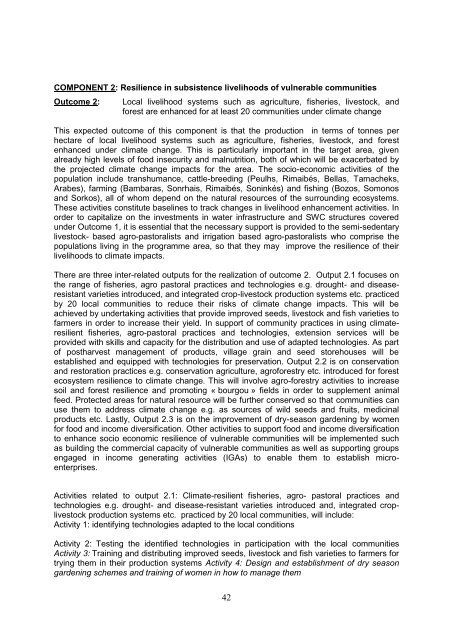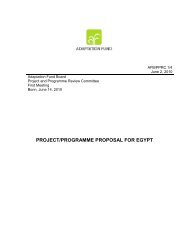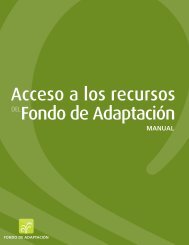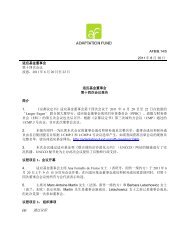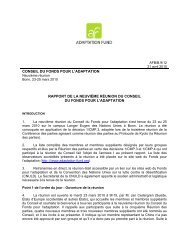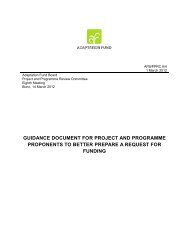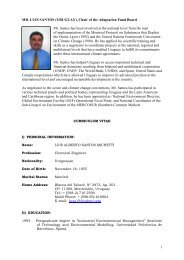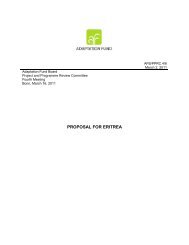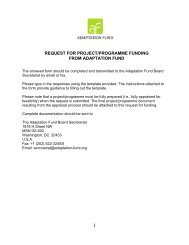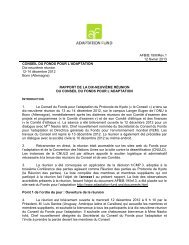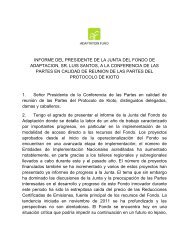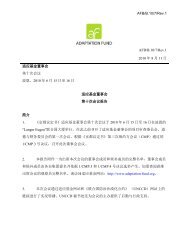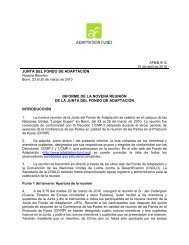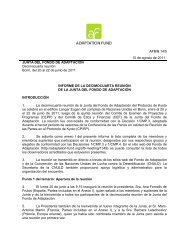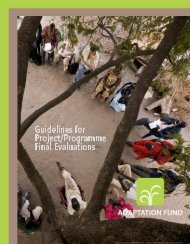PROPOSAL FOR MALI - Adaptation Fund
PROPOSAL FOR MALI - Adaptation Fund
PROPOSAL FOR MALI - Adaptation Fund
You also want an ePaper? Increase the reach of your titles
YUMPU automatically turns print PDFs into web optimized ePapers that Google loves.
COMPONENT 2: Resilience in subsistence livelihoods of vulnerable communitiesOutcome 2:Local livelihood systems such as agriculture, fisheries, livestock, andforest are enhanced for at least 20 communities under climate changeThis expected outcome of this component is that the production in terms of tonnes perhectare of local livelihood systems such as agriculture, fisheries, livestock, and forestenhanced under climate change. This is particularly important in the target area, givenalready high levels of food insecurity and malnutrition, both of which will be exacerbated bythe projected climate change impacts for the area. The socio-economic activities of thepopulation include transhumance, cattle-breeding (Peulhs, Rimaibés, Bellas, Tamacheks,Arabes), farming (Bambaras, Sonrhais, Rimaibés, Soninkés) and fishing (Bozos, Somonosand Sorkos), all of whom depend on the natural resources of the surrounding ecosystems.These activities constitute baselines to track changes in livelihood enhancement activities. Inorder to capitalize on the investments in water infrastructure and SWC structures coveredunder Outcome 1, it is essential that the necessary support is provided to the semi-sedentarylivestock- based agro-pastoralists and irrigation based agro-pastoralists who comprise thepopulations living in the programme area, so that they may improve the resilience of theirlivelihoods to climate impacts.There are three inter-related outputs for the realization of outcome 2. Output 2.1 focuses onthe range of fisheries, agro pastoral practices and technologies e.g. drought- and diseaseresistantvarieties introduced, and integrated crop-livestock production systems etc. practicedby 20 local communities to reduce their risks of climate change impacts. This will beachieved by undertaking activities that provide improved seeds, livestock and fish varieties tofarmers in order to increase their yield. In support of community practices in using climateresilientfisheries, agro-pastoral practices and technologies, extension services will beprovided with skills and capacity for the distribution and use of adapted technologies. As partof postharvest management of products, village grain and seed storehouses will beestablished and equipped with technologies for preservation. Output 2.2 is on conservationand restoration practices e.g. conservation agriculture, agroforestry etc. introduced for forestecosystem resilience to climate change. This will involve agro-forestry activities to increasesoil and forest resilience and promoting « bourgou » fields in order to supplement animalfeed. Protected areas for natural resource will be further conserved so that communities canuse them to address climate change e.g. as sources of wild seeds and fruits, medicinalproducts etc. Lastly, Output 2.3 is on the improvement of dry-season gardening by womenfor food and income diversification. Other activities to support food and income diversificationto enhance socio economic resilience of vulnerable communities will be implemented suchas building the commercial capacity of vulnerable communities as well as supporting groupsengaged in income generating activities (IGAs) to enable them to establish microenterprises.Activities related to output 2.1: Climate-resilient fisheries, agro- pastoral practices andtechnologies e.g. drought- and disease-resistant varieties introduced and, integrated croplivestockproduction systems etc. practiced by 20 local communities, will include:Activity 1: identifying technologies adapted to the local conditionsActivity 2: Testing the identified technologies in participation with the local communitiesActivity 3: Training and distributing improved seeds, livestock and fish varieties to farmers fortrying them in their production systems Activity 4: Design and establishment of dry seasongardening schemes and training of women in how to manage them42


